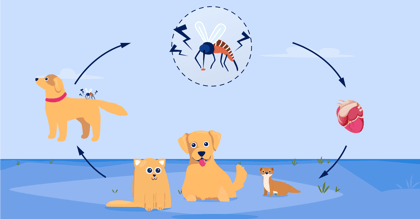Parasites in Dogs: Causes, Symptoms, and Treatment

Table of Contents
Parasites in dogs is a common issue that can cause major health problems for all dogs, especially young puppies. Dog parasites can range from intestinal worms to more serious infections that affect the heart or lungs.
Identifying and treating symptoms is extremely important to prevent lasting damage to your pup’s body, so if you suspect that they may have a parasite they should be evaluated by a veterinarian immediately. Regular screenings for parasites and deworming treatments for puppies can also help to prevent infections.
In this article I’ll explain symptoms to look out for and treatment options for parasites in dogs. I’ll also provide additional resources so that you can make the most informed health decisions for your pups.
What are Dog Internal Parasites?
Dog internal parasites are an umbrella term for any type of internal parasite living inside your dog. These organisms take up residence feeding in your pup’s intestinal tract. They can cause symptoms ranging from inflammation to upset stomach to anemia and, in serious cases, can even cause severe heart or lung issues.
Parasites are extremely common and easily transmissible from food or environmental exposure, so making sure that your dog is regularly checked for worms and other parasites is important for managing their overall well-being. Fortunately, in most cases parasites in dogs are easily treatable and pups will make a full recovery with proper care.
Types of Internal Parasites in Dogs
There are many different types of dog internal parasites that can cause issues for your pet. The most common parasites in dogs include tapeworms, hookworms, roundworms, whipworms, heartworms, and giardia.
Tapeworms
Tapeworms such as Dipylidium caninum reside in your dog’s intestines and are transmitted by ingesting an infected flea. They can cause intestinal distress and stunt the growth of a growing puppy.
Dog owners should also be wary of the zoonotic parasite Echinococcus, which is transmissible to humans.
Keep reading: Zoonotic Diseases in Dogs
Hookworms
Hookworms like Ancylostoma caninum, Ancylostoma braziliense, or Uncinaria stenocephala attach to your pup’s intestine after being ingested.
Since they feed on blood, they can cause anemia which can progress leading to weakness or more serious symptoms.
Roundworms
Roundworms such as Toxocara canis or Toxascaris leonina are easily transmitted to dogs from exposure to infected feces.
These worms can cause severe bloating and gastrointestinal distress for your pup, and may stunt growth of developing puppies since they are unable to absorb nutrients properly.
Whipworms
Whipworms such as Trichuris vulpis, inhabit the large intestine and colon. They are typically transmitted by contaminated soil or water and once attached they feed on blood.
Whipworms can cause diarrhea, weight loss, and in severe cases anemia.
Heartworms
Heartworms, or Dirofilaria immitis, are transmitted to dogs via an infected mosquito.
Heartworm larvae enter a dog’s bloodstream and collect in the heart and lungs, which can cause significant, lasting, and life-threatening damage if not addressed early.
Test Your Knowledge of Heartworm
1. Dogs can get heartworms from other animals
2. Once dogs are treated for heartworm, they become immune to future infections
3. Heartworm disease is only a problem in some states
4. Heartworms can only live inside a pet for 6 months
5. Heartworm disease can be deadly
6. My cat cannot get heartworm disease
7. My pet only needs heartworm preventative in the spring and summer months
8. I don’t need a prescription for my dog’s heartworm prevention
9. My pet does not need an annual heartworm test if they receive heartworm prevention
10. Heartworm treatment costs about the same as prevention
View Results
Your Score is
1. Dogs can get heartworms from other animals | FALSE
Heartworms can only be transmitted to your pet by infected mosquitoes. Mosquitoes carry heartworm larvae that they have picked up from infected animals. The larvae develop in the mosquito, which can then be passed on to dogs and cats when bitten by the infected mosquito.
When a pet is bitten, the heartworm larvae are transferred onto their cat or dog’s skin, entering the bloodstream and migrating to the heart and lungs. It takes approximately six months for larval worms to migrate, mature, and reproduce.2. Once dogs are treated for heartworm, they become immune to future infections | FALSE
3. Heartworm disease is only a problem in some states | FALSE
4. Heartworms can only live inside a pet for 6 months | FALSE
5. Heartworm disease can be deadly | TRUE
6. My cat cannot get heartworm disease | FALSE
7. My pet only needs heartworm preventative in the spring and summer months | FALSE
8. I don’t need a prescription for my dog’s heartworm prevention | FALSE
9. My pet does not need an annual heartworm test if they receive heartworm prevention | FALSE
10. Heartworm treatment costs about the same as prevention | FALSE
Share Quiz
Giardia
Giardia is a microscopic protozoan that infects the small intestine of dogs. It is found in contaminated water, food, or environments.
This protozoan causes vomiting, diarrhea, and dehydration which can lead to lethargy and weight loss if left untreated.
Causes of Parasites in Dogs
Dogs can pick up parasites from a variety of environmental factors, such as:
- Ingesting a parasite or eggs in food or water
- Bite from an infected mosquito
- Exposure to feces from an infected dog
Once a dog is exposed and the parasite takes hold in their intestinal tract or organs, treatment is required to resolve their symptoms.
Signs Your Dog has Parasites
Dogs will present a range of symptoms if infected with a parasite, ranging from mild to severe. If your dog presents any of the following symptoms, especially if you notice symptoms escalating in severity, contact a qualified veterinarian immediately so that we can assess your dog and rule out a parasitic infection.
Common symptoms of a parasitic infection in dogs include:
- Fatigue, weakness, and weight loss
- Increased appetite without gaining weight
- Distended belly, especially in puppies
- Scooting or rubbing rear end against the floor to relieve itchiness
- Diarrhea or blood present in feces
- Visible worms in your pup’s feces or fur
Hassle-free Pet Blood Work From the Comfort of Home
Is it time for your pet’s yearly heartworm test? We bring diagnostic tests right to your home.
When to Seek Veterinary Care
Intestinal parasites in dogs can be incredibly serious if left untreated. If your dog is demonstrating any of the symptoms above and you have a suspicion that they may have a parasite, schedule a consultation with a qualified veterinarian who will make sure that your pup receives the care they need.
It is much better to have a false alarm than to let a parasitic infection go untreated, which can cause lifelong and potentially life-threatening issues.
If your pup is commonly exposed to other dogs or potential contaminants you may also want to consider preventive medication to preempt infections altogether. Schedule a consultation with a veterinarian if you are concerned about your pet’s lifestyle or environment.
Diagnosing Dog Parasites
Regular screening for parasites should be done annually as part of your dog’s standard health checkups, but if your dog is suffering from acute symptoms a prompt visit with your veterinarian is recommended.
If we suspect that your dog is suffering from a parasitic infection, there are a number of diagnostic methods we can employ to confirm what is causing their symptoms.
- During the course of a comprehensive veterinary examination, we will typically review fecal and blood samples to screen for overall health or specific types of worms (including heartworm).
- Some parasitic dog infections can be diagnosed with a simple visual exam of your dog’s rear, fecal testing, or a method called fecal flotation which checks for the presence of eggs in your dog’s stool.
All methods of diagnosis are minimally invasive and will not cause significant discomfort to your pup. We always take great care to ensure that your dog feels safe, calm, and comfortable during any examination.
Treating Internal Parasites in Dogs
Once a diagnosis has been made and a parasitic infection is confirmed in a dog, we begin a prompt treatment course.
Typically this will involve an oral medication like a dewormer that will kill the parasite and help your dog to expel it.
Treatments vary based on the type of parasite and the severity of the infection, but can range from over-the-counter medications to prescription antibiotics. The treatment process can take up to several months to ensure that all parasites have been killed.
Preventive treatments like heartworm medication are also available to take a proactive approach to combating parasitic infections.
To discuss specific treatment plans and medications, consult a qualified veterinarian or schedule a consultation with one of the experienced veterinarians at BetterVet.
Prognosis of Dogs with Internal Parasites
Most dogs diagnosed with internal parasites are able to make a full recovery with prompt treatment. I recommend that most dogs who experience a parasitic infection maintain regular checkups and, if necessary, continue on a regular course of deworming medication to reduce the risk of re-infection.
Maintaining high standards of cleanliness, grooming, and routine veterinary checks minimizes your pup’s risk of experiencing a parasitic infection again.
Dogs who have lost significant amounts of weight may benefit from a specialized nutrition plan developed by a qualified veterinarian. Pups who have suffered long-term effects like lung or heart damage can have their symptoms managed with medication and return to a comfortable quality of life.
How to Prevent Internal Parasites in Dogs
Parasitic infections are best and most easily treated when caught early. Preventive care is key for maintaining your dog’s health and keeping them safe from parasites.
Your dog should receive routine checkups for intestinal parasites as part of their annual wellness checks, and additional visits if they are presenting symptoms of an infection.
I also recommend taking a proactive approach to managing your dog’s environment and diet. Ensure that your dog only drinks clean water and eats cooked foods. Ensure that their living spaces, including bedding and kennels, are regularly cleaned. Monitor your dog when they’re out on walks and prevent contact with feces from other animals.
Standard deworming treatment may be recommended for dogs with a high lifestyle risk, and preventive medication is also recommended for young puppies who are more prone to parasitic infections. If you’re unsure of the best course of action for your dog, contact your veterinarian and we will be able to recommend the best preventive options for your pup.
Conclusion
Dealing with canine intestinal parasites can be confusing and scary for pet owners, but typically these infections are easily treatable. Schedule regular wellness visits for your pup to stay on top of deworming and parasite screenings. To prevent parasitic infection as best as possible, make sure to maintain a clean environment and ensure that your dog only drinks clean water and eats well-cooked food.
If you’re concerned that your dog may have a parasitic infection, I recommend scheduling a consultation with a veterinarian immediately.
Frequently Asked Questions
What is the most common dog parasite?
The most common types of internal parasites in dogs are tapeworms, hookworms, heartworms, roundworms, whipworms, and giardia.
What do parasites look like in dog poop?
If parasites are visible in your dog’s feces they may look like small, wriggling worms, or larvae. You may also notice worms in or around your dog’s rear. It is important to remember that many internal parasites are not visible to the naked eye and further diagnostics are needed to diagnose the parasite infection.
Can dogs pass parasites to humans?
Most dog parasites are not zoonotic, or transmissible to humans. Although, roundworms, hookworms, and some types of tapeworms can be passed from your dog to you, young children, or individuals that are immunocompromised, so it is very important to avoid contact with feces or contaminated environments.
Do dog internal parasites go away?
Common dog parasites are easily treatable and will go away with a full course of treatment. While medication to kill them may take several weeks or months, it will completely eliminate all parasites living in your dog and cure the infection. Sanitizing and maintaining a clean environment will help to reduce chances of reinfection.
How serious are internal parasites in dogs?
Some types of dog parasites are more dangerous than others, but they all pose serious health risks and should be addressed immediately. Common parasites can cause weight loss, fatigue, and weakness, and others can cause lasting damage to liver or heart tissue.






